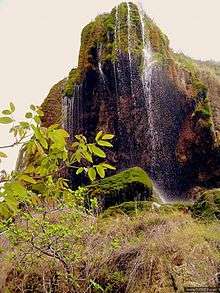Güney Waterfall
| Güney Waterfall Güney Şelalesi | |
|---|---|
 Güney Waterfall (April 2007) | |
 | |
| Location | Denizli Province, Turkey |
| Coordinates | 38°07′12″N 29°03′36″E / 38.12000°N 29.06000°ECoordinates: 38°07′12″N 29°03′36″E / 38.12000°N 29.06000°E |
| Total height | 20 m (66 ft) |
Güney Waterfall (Turkish: Güney Şelalesi) is a waterfall in Denizli Province, western Turkey. It is a registered natural monument of the country.[1]
Location and access
The waterfall is located in the Cindere village of the Güney district of Denizli Province. It is 70 km (43 mi) distant from Denizli and 3 km (1.9 mi) from Güney.[2][3] The road to the waterfall is paved with cobblestones.[4]
Waterfall
The waterfall is fed by waters of a spring dropping from a height of 20 m (66 ft), which joins the Büyük Menderes River. The carbonated water dissolved limestone formation rocks and formed travertines on the waterfall base. A cave situated under the waterfall contains a pond.[2]
It is a popular visitor attraction. Around 20,000 local and foreign tourists visit the site annually.[3]
Used as a local recreational area since the 1960s,[5] the waterfall and its surroundings, which cover an area of 4.98 da (536 sq ft), was registered in 1994 as a natural monument by the Nature Reserve and Nature Parks Administration of the Ministry of Forest and Water Management.[1]
In the summer of 2007, the waterfall faced the risk of disappearance due to drought in the region.[5] To overcome the threat, water was brought by pipeline over a distance of 600 m (2,000 ft).[6] The 20 m (66 ft)-high rock wall of the waterfall collapsed following a landslide, which occurred in the afternoon of May 13, 2013. As a result of the rockfall, the waterfall almost disappeared. One person at the site sustained light injuries.[3] In April 2014 workers diverted the stream and reestablished the waterfall about 50 m (160 ft) to the side of the waterfall's initial location. Facilities were added to the site for outdoor recreation. The waterfall area was also illuminated to accommodate nighttime visitors.[4]
References
- 1 2 "Türkiye'nin Tabiat Anıtları" (PDF) (in Turkish). Milli Parklar. 2015-07-01. Retrieved 2016-10-27.
- 1 2 "Güney Şelalesi" (in Turkish). Denizli Valiliği. Retrieved 2016-10-27.
- 1 2 3 Boyacı, Osman Nuri; Ramazan Çetin (2013-05-13). "Güney şelalesi yok oldu". Hürriyet (in Turkish). Retrieved 2016-10-27.
- 1 2 Çetin, Ramazan (2014-04-17). "Güney Şelalesi sezona hazır". Hürriyet (in Turkish). Retrieved 2016-10-27.
- 1 2 Çetin, Ramazan (2007-08-16). "Kuraklık, Güney Şelalesi'ni kuruttu". Hürriyet (in Turkish). Retrieved 2016-10-27.
- ↑ Boyacı, Osman Nuri; Ramazan Çetin (2013-05-14). "Güney Şelalesi heyelanla çöktü". Hürriyet (in Turkish). Retrieved 2016-10-27.